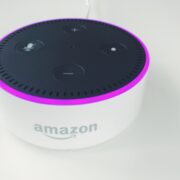The Future of Smart Speakers and What it Means for your Business
Contributed by Bryce Ward
Each year it seems more and more people are having conversations with a speaker. “Hey Alexa, what’s the weather like?” “OK Google, play Bob Marley radio.” The list goes on. When smart speakers first arrived, they seemed like a novelty item, a fun gift for loved ones, but each year smart speaker sales continue to climb and more and more questions are being directed towards an inanimate speaker. Studies predict that 50% of American households will have a smart speaker by the end of 2020[1] – this is an eyebrow-raising statistic considering that smart speakers have only been around for a handful of years. But so far, smart speakers are only prevalent in homes – what does the surge in smart speaker usage mean for your business?
Amazon Alexa currently leads the way in the smart speaker market, with Google Home right behind, but the differentiating factor between the two tech giants is inherent in their names: Google is restricting itself to home use; Amazon, however, is expanding their focus elsewhere, to businesses. Amazon has already released a suite of smart speaker products and features designed specifically for businesses, aptly named “Alexa for Business,” and they don’t appear to be slowing down any time soon. Google Home, consequently, is gradually stealing pieces of the smart speaker market share from Amazon, but Amazon doesn’t seem to be too concerned. This is probably because the future implications of smart-speaker technology in the workplace far exceed the potential benefits to be had from an already well surveyed home market.
At this point, I may sound like a sales rep for Amazon, but that’s only because Amazon has been the only company thus far to acknowledge the potential of smart speakers in the workplace. I have no doubt Google will follow suit once businesses begin adopting smart-speakers into their daily routines, and due to the inherent desire for businesses to become more efficient, it’s only a matter of time before they begin incorporating smart speaker features that streamline workplace tasks.
The most promising smart speaker feature for businesses to surface so far is Amazon’s “Business Blueprints.” Essentially, the Blueprints allow you to craft smart speaker requests specifically to your business’ needs – from password requests to retrieving client information, the possibilities are as endless as your imagination. If you’re still not convinced, imagine having a personal A.I. robot assistant around the office at all times that can be summoned by anyone at any time to assist in any task you may need – that is where smart speaker technology is headed, and Amazon is well aware. Creativity and openness to change has always been a decisive factor in separating businesses from their competition, especially when it comes to technological advancements. The rise of smart speakers is no different.
[1] https://www.strategyanalytics.com/access-services/devices/connected-home/smart-speakers-and-screens/market-data/report-detail/global-smart-speaker-and-screens-shipment-and-installed-base-forecast-for-88-countries-2014-to-2024-q1-’19-update




